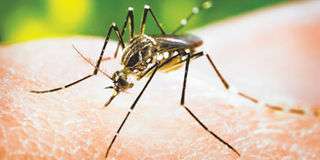Government moves to control spread of dengue fever

What you need to know:
- At least two people have died, 1,222 others diagnosed with dengue fever in Dar es Salaam, Tanga and Singida regions 24 days since the government’s declaration on the disease.
Dar es Salaam. Two people have been confirmed dead from dengue fever, with another 1,222 diagnosed with the fever in Dar es Salaam, Tanga and Singida Regions.
In the event, the government has rushed to tackle the malady as the number of infections rises.
Speaking to The Citizen in Dar es Salaam yesterday, the deputy minister for Health, Community Development, Gender, Elderly and Children, Dr Faustine Ndugulile, said the number of dengue patients rose from 307 diagnosed cases by April 12 this year to 1,222 cases recorded by May 3.
“Two people have died of the disease so far. Dar es Salaam is leading, with 1,145 dengue patients, followed by Tanga with 76 patients and Singida, which has registered one patient,” he said.
Outlining efforts to control the disease, Dr Ndugulile said reagents have already arrived in the country for laboratory investigation of the disease – and that district councils have been directed to procure pesticides and fumigate their respective areas.
“President John Magufuli has directed district councils to allocate funds for purchasing pesticides, as well as carry out fumigation to destroy breeding sites of mosquitoes and other pests,” he said.
“We are now mobilizing people to take preventive measures, such as covering water containers in homes, and destroying mosquito-breeding grounds.” He also warned against taking drugs containing diclofenac – such as Ibuprofen, Brufen and Diclopar.
In the government’s initial warning, the chief medical officer, Prof Muhammad Kambi, said drugs containing diclofenac cause internal bleeding, leading to death when taken by dengue patients.
An Ifakara Health Institute researcher, Dr Nicholaus Govela, named Aedes aegypti as the dengue-transmitting mosquito, noting that it doesn’t carry malaria-transmitting parasites due to its morphological differences from the malaria-transmitting Anopheles.
“Similar reasons explain why mosquitos cannot transmit HIV/Aids,” he said, helpfully adding that dengue-transmitting mosquitos bite during daytime.
Dengue treatment
A Dodoma Christian Medical Centre medical officer, Dr Patrick Kushoka, said dengue fever treatment involves intravenous fluids and fever-lowering antipyrexia.
“We also use paracetamol. Patients are treated in isolation to reduce the possibility of spreading the disease. Also, isolation enables medics to make close follows-up and spontaneously address complications,” he said.
In Tanzania, dengue was reported in 2010, 2013 and 2014, with patients suffering from the disease showing symptoms similar to those of malaria.
Medical reports show that most dengue patients have minor illness, while a few cases develop serious illness, including especially bleeding and hypotension.




